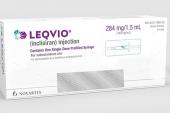Pricey Inclisiran Is Rolling Out: a ‘Buy-and-Bill’ Model May Smooth Its Path
At $6,500 per year, without outcomes data, inclisiran faces hurdles. Doctors still expect it to be “transformative.”

Healthcare systems are slowly gearing up for the commercial availability of inclisiran (Leqvio; Novartis), a therapy given just twice a year in the doctor’s office to lower LDL-cholesterol levels. The drug, which was approved in the last week of 2021 after a protracted process, has been hailed as a potential “game-changer.”
But questions remain. Approvals by both US and European regulators were based on LDL-lowering effects, established in the ORION trial series, but outcomes data are still years away. The drug will come with a hefty price tag—Novartis said the wholesale acquisition cost (WAC) of inclisiran is $3,250 USD per injection, or $6,500 annually based on a schedule of two doses per year. And while the what and when are known, the who, where, and how of the drug remain hazy.
Despite the costs and unknowns, physicians told TCTMD they are excited by the prospect of having the small interfering RNA (siRNA) therapy as an option for patients.
“We have many [familial hypercholesterolemia] patients that have already contacted us about how to get on inclisiran,” said Joshua Knowles, MD, PhD (Stanford University School of Medicine, CA). “They've been on a PCSK9 inhibitor, they're not worried about side effects, but they want to do something that will protect them for 6 months rather than inject themselves every 2 weeks.”
“In terms of the medical benefit of this drug, I wholly expect to prescribe it pretty liberally, the same way I prescribe PCSK9 monoclonal antibodies,” he told TCTMD. “I'm excited about the mechanism and many of my patients are excited about the prospect of only having to get one shot every 6 months. I think targeting PCSK9 makes a lot of sense for cardiovascular risk reduction, and inclisiran is just a novel way to target PCSK9 that has advantages over what we are already doing.”
Coping With the Cost
At its current list price, inclisiran is in the ballpark of PCSK9 inhibitors—both Amgen and Sanofi/Regeneron have cut the list price of evolocumab (Repatha) and alirocumab (Praluent), respectively, to $5,850 annually—but cost could still prove a sticking point for payers. When alirocumab and evolocumab were approved by the US Food and Drug Administration in 2015, uptake of the PCSK9 inhibitors was low because many patients couldn’t get their insurance companies to pay up. The initial price had a lot of do with it—both were priced north of $14,000 per year—and the extensive paperwork required for preauthorization was onerous.
We have many FH patients that have already contacted us about how to get on inclisiran. Joshua Knowles
Robert Rosenson, MD (Icahn School of Medicine at Mount Sinai, New York, NY), who is the director of a cardiometabolic disorders clinic, believes inclisiran will be a transformative therapy, noting that an injectable LDL-lowering medication given twice annually will change the landscape of atherosclerotic cardiovascular disease (ASCVD) prevention. The current list price, however, “makes no sense” because it’s more expensive than the approved PCSK9 inhibitors, two drugs with solid clinical outcomes data behind their name.
“How is it that this compound comes in at a higher cost?” he asked. “Our decision to prescribe is really dependent on whether the insurance company is going to pay for a higher-cost medication.”
Reimbursement also concerns other physicians, including Knowles, chief research officer of the Familial Hypercholesterolemia (FH) Foundation.
“The most important thing that matters is whether insurance companies cover it and the out-of-pocket cost for patients,” he said. “Every procedure in medicine has a list price that's way higher than what's actually reimbursed or paid for, and that’s really the key. Are patients going to be able to get it covered through their insurance? What is the co-pay? What safety nets are there going to be?”
Drugs, continued Knowles, “don’t work unless they’re approved by insurance companies.”
Connecting Patients With the Drug
Given the paperwork and preauthorization hurdles that plagued the rollout of the PCSK9 inhibitors, the logistics of prescribing inclisiran is something that physicians say is top of mind. They may, however, see this swiftly resolved.
To TCTMD, a Novartis spokesperson explained that inclisiran is being launched as a “buy-and-bill” therapy, the first of its kind in cardiology. Under this model, it would be purchased by the healthcare provider and/or system then be administered to the patient in the office. That’s in contrast with other LDL cholesterol-lowering drugs like statins, ezetimibe, and the PCSK9 inhibitors alirocumab and evolocumab, for which patients are prescribed the drug by their doctors but fill the prescription at the pharmacy (a specialty pharmacy in the case of the PCSK9 inhibitors). Novartis is currently working with healthcare systems that already have buy-and-bill capability in other therapeutic areas, and also helping doctors and hospitals “navigate early acquisition and reimbursement complexity.”
Our decision to prescribe is really dependent on whether the insurance company is going to pay for a higher-cost medication. Robert Rosenson
For doctors who don’t want to set up buy-and-bill services within their center or office, Novartis has developed a network of roughly 1,000 alternative injection centers that will acquire and administer inclisiran. Physicians can look up the closest site and refer patients there for treatment.
As a healthcare provider-administered drug, inclisiran will be covered by the medical benefit pathway (as opposed to the pharmacy benefit pathway), which differs from other medications, including alirocumab and evolocumab. Novartis is hopeful this will reduce hurdles around access, particularly for Medicare fee-for-service patients. Under this pathway, Novartis says that 70% of patients eligible for inclisiran would have zero co-pays.
“It will take some time for Medicare Advantage and commercial payers to develop and implement policy,” a Novartis spokesperson told TCTMD. This process usually takes anywhere between 3 and 9 months after a drug is approved. “Given the significant unmet need of patients still not at their LDL-cholesterol goal, we expect payers to recognize the benefit of providing access to Leqvio for appropriate ASCVD patients and will be working directly with them to facilitate access. In the interim, we will support customers through the appeals/medical exception processes.”
A ‘Patient-Friendly Process’?
Thus far, nobody who spoke with TCTMD has administered inclisiran outside of a clinical trial, noting that the novel prescribing process is still being worked out amongst hospital management, pharmacy, nursing, and others. Nor could anyone say what preauthorization might look like from commercial payers, or if it will be required with every injection.
“You want to have a patient-friendly process,” said Douglas Jacoby, MD (University of Pennsylvania Health System), who is the medical director of preventive cardiology and lipid management. “But the combination of pharmaceutical company, insurance company, and health system logistics and regulations mean a lot of things still need to be figured out.”
In Europe, regulators approved inclisiran for lowering LDL-cholesterol levels in patients with hypercholesterolemia or mixed dyslipidemia in late 2020. In the UK, the National Health Service (NHS) and Novartis agreed to a discount to make the drug broadly available at the population level. At the discounted price, the National Institute for Health and Care Excellence (NICE) has concluded inclisiran is cost-effective in selected secondary prevention patients.
Given the US healthcare system and reimbursement issues, Novartis said they don’t anticipate any commercial population health agreements with private health systems or payers for inclisiran.
Lack of Outcomes Data, for Now
Inclisiran, which works by inhibiting production of PCSK9 but through a different mechanism than alirocumab and evolocumab, is approved as an adjunct to diet and maximally tolerated statin therapy in patients with ASCVD or heterozygous FH with LDL-cholesterol levels that remain stubbornly too high. Following a first injection, a second injection is given at 3 months, and others follow subsequently every 6 months thereafter.
You want to have a patient-friendly process. Douglas Jacoby
The approval is based multiple clinical trials showing the siRNA lowered LDL-cholesterol levels in different patient populations prescribed maximally tolerated statin therapy including ORION-9, ORION-10, and ORION-11. In those studies, the mean placebo-adjusted reduction in LDL cholesterol was approximately 50%. The 15,000-patient outcomes trial, known as ORION-4, is being led by researchers at the University of Oxford in collaboration with the TIMI Study Group, but the results are not expected until 2026.
Physicians say they’re looking forward to seeing what ORION-4 delivers, though this likely won’t stop them prescribing the drug in the meantime.
“Obviously, it would be nice to see [randomized, controlled trial] outcomes’ evidence,” said Soffer. “It's a different drug delivery system than the monoclonal antibodies, but there hasn't been any signal of harm in the RCTs thus far. I can't say zero hesitancy about [using] a drug without clinical outcomes data, but I don't have serious concerns.”
As long as patients are made aware that the data aren’t robust just yet, Soffer expects some, given the ease of use, will want to switch from their current PCSK9 inhibitor to the twice-yearly injection.
Knowles, likewise, isn’t worried about the lack of outcomes data for now.
“The genetic data strongly suggests that lower PCSK9 activity will be beneficial,” he said. “The data from other PCSK9 inhibitors strongly suggests that it will be beneficial. I have no worry that the outcome data will be positive. Certainly, those trials need to be done and they are going to be done, because we have to look for other side effects and things that could diminish the efficacy. But, personally, I don't have a worry that they'll be okay.”
Leslie Cho, MD (Cleveland Clinic, OH), said a long-term clinical outcomes study needs to show not only that the siRNA therapy reduces ASCVD events, but also that it’s safe. She noted that statins have documented pleiotropic effects, including anti-inflammatory, though data from ODYSSEY Outcomes with alirocumab and FOURIER with evolocumab showed that lowering LDL cholesterol by inhibiting PCSK9 effectively prevents ASCVD events.
“If we extrapolate that, the [siRNA] inhibitor for PCSK9 could theoretically show a benefit,” she said. “However, we await their cardiovascular outcomes trial.”
I can't say zero hesitancy about [using] a drug without clinical outcomes data, but I don't have serious concerns. Daniel Soffer
Most of the ORION trials conducted to date were relatively short term, said Cho. Potential side effects, including any risk of allergies, might not emerge until patients are treated for longer periods, including in the 5-year follow-up of those enrolled in ORION-4. “Until then, [inclisiran] will be for a very unique, selective group of patients,” said Cho.
It’s also important to note that compliance with generic statins can frequently be improved, Cho noted. In 2016, rosuvastatin became the last statin to come off patent and ezetimibe followed suit the same year; taken together, the two generics cost just a fraction of therapies targeting PCSK9. Before giving up on inexpensive therapies and moving on to more-novel agents, Cho noted, a majority of patients can ultimately adhere to treatment if the statin is dosed intermittently, which they’ve shown in published studies based on their experience.
The higher price of these new agents is why cost-efficacy analyses from ORION-4 will be essential, said Rosenson. “In other words, with this therapy, how many events are avoided? And what is the cost of the therapy for the number of events avoided? The health economic analysis—that’s what’s important.”
Unmet Clinical Need
For Jacoby, the approval of inclisiran will be a welcome addition for physicians trying to get high-risk patients to appropriately controlled LDL-cholesterol levels.
“If you look at statin therapy, more than 70% of people at high ASCVD risk don't achieve optimal risk reduction and don't get to the goals they should get to according to the guidelines,” he said. “Statins alone leave a huge unmet need.”
The [siRNA] inhibitor for PCSK9 could theoretically show a benefit. However, we await their cardiovascular outcomes trial. Leslie Cho
Not everyone is willing to inject themselves with the monoclonal antibodies every 2 to 4 weeks, said Jacoby. “Now you're not shipping medication to someone's house and expecting them to do it. It’s like a twice-a-year vaccine that has excellent compliance potential.”
Importantly, Jacoby doesn’t view the approval of inclisiran as competition for the two PCSK9 inhibitors, even though they might be viewed as natural adversaries.
“The reality is that a very, very low percentage of people eligible for PCSK9 inhibitors actually get them,” he said. “I'm hoping that it doesn't pull from the market of the ones that are currently out there on those drugs. I'm hoping it expands the market, because what we know is that lower LDLs are more protective and that most people are really not achieving optimal LDLs.”
With this fourth clinical option, inclisiran is one more opportunity for patients and providers “to jump at the ability to really cut down future heart attacks and strokes,” said Jacoby.
Rosenson, who was involved in several of the ORION trials testing inclisiran, said giving the drug in the doctor’s office eliminates any of the guesswork around whether patients are adhering to treatment and that there will be subsets of patients who would particularly benefit from a twice-yearly, office-based injection. This includes older patients with severe arthritis in their hands who might have trouble with self-injection. Some of the older patients who struggle with the pen injector also don’t accurately dispense the PCSK9 inhibitor and waste the medication, he said.
“For them, this would be a solution,” said Rosenson.
Soffer noted that the involvement of PCSK9 in LDL cholesterol was only identified in 2003. Back then, researchers discovered a gain-of-function mutation in the gene that encodes for PCSK9 in a family with FH. To go from that discovery to an approved therapy in 2015 with alirocumab and evolocumab has been nothing short of amazing, he said.
“The exciting part of PCSK9 is the future,” said Soffer. “It's going to be one of the first targets we start thinking about for pharmacologic intervention with gene editing, with making permanent changes. It looks like it's a very safe target and permanently inhibiting it with gene editing is something that’s pretty exciting.”
Soffer suspects that inclisiran might be a middle ground between PCSK9 inhibitors, which are given every 2 weeks, and gene editing where PCSK9 is knocked out permanently.
“An injection every 6 months is a good go-between for the people who want something that feels permanent, but which is reversible,” he said. “In my mind I'm thinking about the future. I know I'm going to be prescribing gene editing at some point before I retire.”
Michael O’Riordan is the Managing Editor for TCTMD. He completed his undergraduate degrees at Queen’s University in Kingston, ON, and…
Read Full BioDisclosures
- Rosenson’s reports that his employer, The Icahn School of Medicine at Mount Sinai, receives fees for contracted research with Novartis. Rosenson reports participating in an advisory board with Novartis on lipoprotein(a) in 2021.
- Knowles reports serving as the chief research officer of the FH Foundation (uncompensated).
- Cho reports serving as a principal investigator for Novartis-funded Lp(a)HORIZONS trial testing a novel antisense oligonucleotide therapy for lowering Lp(a).
- Jacoby and Soffer report no relevant conflicts of interest.
- Soffer reports serving as a consultant to Akcea/Ionis Pharmaceuticals and Novartis, and as an investigator for clinical trials sponsored by Amgen, Akcea/Ionis Pharmaceuticals, Novartis, Regeneron, RegenXBio, and AstraZeneca.





Comments